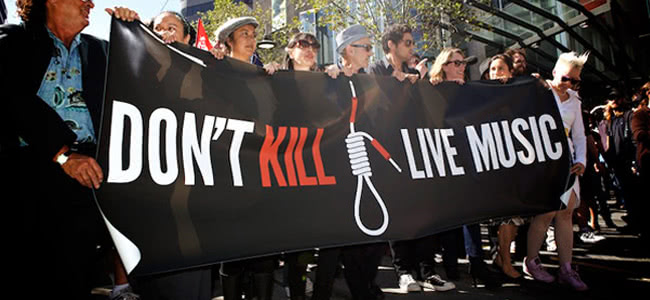Contemporary music organisations and musicians are outraged with news that boutique classical music label Melba, which released just three albums last year, is seeking a further $3 million in funding after grants of over $7 million to the company in the last few years.
The funding outrage was uncovered by SLAM, who hosted the rally in Melbourne two years ago that saw thousands of contemporary music lovers take to the streets to protest draconian laws that demonised the performance of live music.
Now a number of leading music professionals have written to federal Arts Minister Simon Crean protesting the disproportionate allocation of funds and protesting Melba’s ability to sidestep the peer review process contemporary music is forced to use.
According to The Australian, Melbourne-based Melba Recordings released just three albums in the past year despite receiving $750,000 in government grants for 2010/2011. During the same period the label managed to earn a measly $18,000 from record sales, including those from their back catalogue.
To put that into perspective, ABC Classics released 23 recordings over the same period, whereas small independent labels Tall Poppies and Move regularly produce six to 10 discs a year with almost no government funding.
Melba also received $5m in 2004 and $2.25m in 2009 from the federal government, but not through competitive grant rounds such as those of the Australia Council.
The label counts a number of prominent Australians as backers, such as Dame Elisabeth Murdoch, Baz Luhrmann, and Sir James Wolfensohn, and detractors accuse their backers of exerting undue political influence to continue their funding.
According to industry insiders, Melba bypassed the Australia Council and with the aid of “very influential friends” went above the Arts Minister to then-Treasurer Peter Costello. Their funding has been maintained ever since despite very little music of any notoriety being produced since.
Melba’s managing director, Maria Vandamme, said the label “been denied the possibility of peer assessment because there is no program at the Australia Council to support our work”. But that excuse doesn’t fly with SLAM who are outraged at the preferential treatment Melba has received.
“The news that reveals the Australian Government’s arts funding body the Australia Council has been funding the boutique record label Melba Recordings to the tune of $7.25 million since 2004 should be cause for concern for every single arts organisation in Australia,” read a statement from SLAM.
“As members of the contemporary music sector, we are outraged that this amount of funding should be provided to a single organisation outside of the peer review process. The sheer size of the initial grant provided to Melba Recordings is equal to the entire budget of the music board of the Australia Council.”
“We are deeply concerned about how this out-of-round funding came about and call on the Australian Government to do a full investigation into the Australia Council and the role of all the Federal Arts Ministers since 2004.”
“At a time when technology is threatening the livelihood of musicians and election promises to the contemporary music sector remain undelivered, we call on the Australian Government to redirect this funding to urgent contemporary music programs and support.”
“After nearly a decade of consultation with the non classical music sector, government policy has delivered almost nothing. $7.25 million dollars could activate an entire sector providing a wealth of opportunities for contemporary musicians, for professional development, marketing and export markets and emerging musicians.”
Carl Vine, artistic director of Musica Viva and a former deputy chair of the Australia Council agrees, taking particular aim at the ability of Melba to sidestep the peer review process.
“Melba has made some nice recordings, but at around 50 albums over the full course of its history it might be considered more of a hobby than a serious producer of good musical product.”
Melba’s current funding concludes in June according to the director of the music board at the Australia Council. The council said they would be reviewing the outcomes from their funding after that time.

































